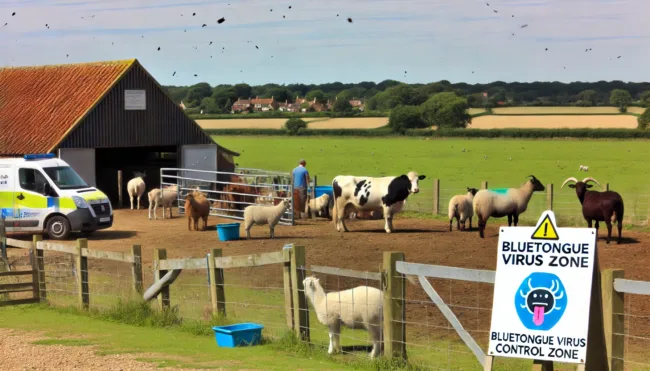Urgent alert as bluetongue virus spreads in Norfolk and Suffolk—farmers must act now!
A bluetongue virus outbreak has prompted the UK Chief Veterinary Officer to declare a restricted zone across Norfolk and Suffolk, as cases of Bluetongue virus serotype 3 (BTV-3) continue to rise. The decision, which replaced the previous Temporary Control Zone (TCZ), was taken to contain the spread of the virus, which is transmitted by midges and affects livestock such as cattle, sheep, goats, deer, and camelids. The zone now encompasses the entire counties of Norfolk and Suffolk, where strict restrictions on the movement of animals and germinal products have been enforced.
The restrictions came into force following the confirmation of five cases of BTV-3 across various premises in these counties. Surveillance and testing are being intensified to detect any further spread, with the Department for Environment, Food & Rural Affairs (DEFRA) and the Animal and Plant Health Agency (APHA) spearheading the response efforts.

Extent of the Outbreak and Risks to Livestock
The virus, confirmed in three more animals on 28 August 2024, has spread locally, raising concerns of an extensive outbreak. DEFRA confirmed that the affected animals are being culled to prevent further transmission. The outbreak was first detected this summer in a sheep on a farm in Haddiscoe, Norfolk, and since then, several new cases have emerged across Norfolk and Suffolk.
The spring and summer months pose a higher risk for bluetongue transmission due to the increased activity of midges that spread the virus. Given the current warm temperatures and midge activity in the UK, there is a heightened risk of the virus spreading further. Farmers are urged to act urgently to contain the outbreak and monitor their livestock for any signs of the disease.
Impact and Measures for Farmers
Bluetongue virus does not affect humans, and the meat and milk from infected animals are safe for consumption. However, the disease can lead to significant economic impacts on farms. Livestock affected by the virus may show a range of symptoms from no visible signs to severe productivity issues, such as decreased milk yield, and in extreme cases, death. As a result, DEFRA has emphasised the need for responsible sourcing of livestock and increased vigilance to mitigate the spread.
Farmers in Norfolk and Suffolk are now required to follow strict protocols when moving animals. Movements within the restricted zone can occur without a licence, but moving animals out of the zone requires specific licensing. A general licence is available for moving animals to designated abattoirs within the zone. The authorities have also provided free testing for animals moving from high-risk counties to other parts of Great Britain to prevent the disease from spreading to new regions.
Government’s Response and Advice to Farmers
UK Chief Veterinary Officer Christine Middlemiss has highlighted the severity of the outbreak, urging farmers to avoid moving animals within the zone unless absolutely necessary and to report any signs of the disease to APHA immediately. She stated, “We have not taken this action lightly and we are clear that farmers and their vets must remain vigilant and report any suspicions to APHA immediately.” The government is committed to working with those affected to protect their animals and will keep the size and nature of the restricted zone under constant review as more information becomes available.
The bluetongue virus is a notifiable disease, meaning any suspicions must be reported to the relevant authorities. In England, cases should be reported to the Animal and Plant Health Agency at 03000 200 301. In Wales, Scotland, and Northern Ireland, there are specific contact numbers provided for reporting.
As the situation develops, farmers and animal keepers are encouraged to stay informed through official channels and take all necessary precautions to safeguard their livestock.
Discover more from Business-News-Today.com
Subscribe to get the latest posts sent to your email.

